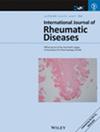Canakinumab Treatment in Familial Mediterranean Fever Patients: With/Without Colchicine
Abstract
Objectives
To compare the differences in attack characteristics, acute-phase reactants, and renal outcomes in patients using canakinumab with or without colchicine treatment.
Methods
FMF patients treated with canakinumab for ≥ 3 months were retrospectively reviewed. Patients unable to continue colchicine for various reasons were identified and grouped as those receiving the canakinumab + colchicine combination (CAN + CLC) and canakinumab monotherapy (CANmono). Attack frequency, C-reactive protein (CRP), urine protein–creatinine ratio (UPCR), and kidney function tests were recorded before and after canakinumab treatment.
Results
Fifty-five patients receiving canakinumab treatment were included in the study. Thirty-one patients (56.4%) used CAN + CLC and 24 (43.6%) CANmono. With both CAN + CLC and CANmono treatment, there was no significant change in UPCR of patient groups with GFR > 60 and < 60 mL/min/1.73 m2. Amyloid A (AA) amyloidosis was present in 21 (38.2%) patients. In patients with AA amyloidosis receiving CAN + CLC, there was a nonsignificant decrease in UPCR and increased creatinine levels after treatment (p = 0.214 and p = 0.051, respectively). Median GFR decreased significantly from 69 (IQR, mg/dl, 45–95) to 44 (IQR, mg/dl, 28–75) with CAN + CLC treatment (p = 0.021). In the CANmono group, compared to baseline values, there was no significant change in posttreatment UPCR, serum creatinine, and GFR values.
Conclusion
It is difficult to make a recommendation regarding the discontinuation or continuation of colchicine treatment in all FMF patients who initiated anti-IL-1 treatment. Canakinumab can be continued as monotherapy in patients who cannot continue colchicine treatment due to side effects and patient noncompliance.


 求助内容:
求助内容: 应助结果提醒方式:
应助结果提醒方式:


